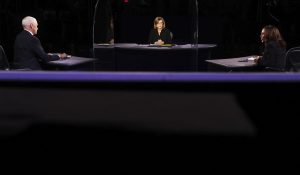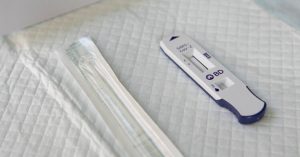Facebook and Twitter are allowing the spread of a video posted by President Trump on Wednesday in which he touts a “cure” for COVID-19.
In a five-minute clip published across both social media platforms, Trump insisted an experimental therapeutic developed by drug-maker Regeneron helped him to recover after contracting the disease, suggesting it will soon be widely available.
The president announced he had tested positive for COVID-19 on October 2 and spent last weekend at Walter Reed National Military Medical Center. He returned to the White House on Monday, despite his breathing appearing to be heavily strained.
In the video released by the White House yesterday, Trump portrayed his treatment as being cure-like. It was seemingly—but ultimately not—in violation of both sites’ policies, which pledge to police false claims about unproven miracle treatments.
Trump said in the video: “We have Regeneron, we have a very similar drug from Eli Lilly, they are coming out and we are trying to get them on an emergency basis.”
He added: “You have various other drugs that help a lot but these, I view these, they call them therapeutic but to me it wasn’t therapeutic, it just made me better, OK, I call that a cure. So I want to get these things done so… we have to get them approved.”
On both social media platforms, Trump’s video was left untouched. It has been viewed at least 16 million times on Twitter, where it has been retweeted close to 80,000 times. On Facebook it has attracted close to 50,000 shares and 30,000 comments.
A Twitter spokesperson told Newsweek via email today Trump’s video tweet “was not in violation of the Twitter Rules regarding COVID misinformation.”
Broadly, the decision was made because the president’s address did not contain a call to action that had the possibility of resulting in real-world harm, Twitter said.
In his video, Trump said he thought catching the disease was a “blessing from God” as it had potentially helped to identify the right treatment, a claim far from proven.
He said in the video: “So we have these drugs, Eli Lilly and the others, that are so good… they are going to say that they are therapeutic, and I guess they are therapeutic, some people don’t know how to define therapeutic, I view it different, it’s a cure.”
Peter Chin-Hong, an infectious disease expert at U.C.S.F. Health in San Francisco, told The New York Times there was no chance Regeneron had cured Trump and suggested he could be feeling the effects of an administered steroid, dexamethasone.
Facebook has repeatedly said it is taking steps to try and limit the spread of hoaxes and misinformation about the contagious respiratory disease responsible for the deaths of more than 211,800 Americans—including posts about COVID-19 cures.
“[We] remove posts that make false claims about cures, treatments, the availability of essential services or the location and severity of the outbreak,” Nick Clegg, Facebook VP of Global Affairs and Communications, wrote in a blog post in March.
Facebook boss Mark Zuckerberg said in an April post on his personal account that the site would remove “misinformation that could lead to imminent physical harm.”
He said general misinformation could be slapped with warning labels providing more context to erroneous claims, but only after it is rated false by fact-checkers.
Twitter has said harmful claims about “preventative measures, treatments/cures, and other precautions” linked to COVID-19 could be considered as a misleading claim if it was made as an “assertion of fact” and “intended to influence others’ behavior.”
Before a post is removed it has to meet three criteria: Is it spreading a claim of fact, is the claim demonstrably false or misleading, and would belief in it lead to harm.
For any less harmful claims, the Jack Dorsey-led platform previously said it will “label or place a warning on tweets” that can provide additional context about the false claims. In a blog post from May, Twitter used a post about a cure as one direct example.
Facebook has been contacted for comment by Newsweek.
Regeneron confirmed yesterday that it had now submitted a request for an Emergency Use Authorization with the Food and Drug Administration in relation to its treatment, an antibody cocktail in clinical trial that’s officially known as REGN-COV2.
Regeneron described the candidate treatment as a combination of antibodies that, in theory, could block infections of the coronavirus that causes COVID-19.
Yet conflicting with Trump’s claim there are hundreds of thousands of doses “just about ready,” Regeneron said there are doses available for roughly 50,000 patients, although it said doses for 300,000 patients could be available in the next few months.
As Regeneron stock was rising on Monday, CNN reported its CEO Leonard Schleifer was previously a member of Trump’s New York golf club and his business received $450 million in government funding in July for treatment development. In 2017, Trump owned shares of drug-makers Regeneron and Gilead Sciences.
For now, COVID-19 health guidance hasn’t changed: there is no cure.
“While some western, traditional or home remedies may provide comfort and alleviate symptoms of mild COVID-19, there are no medicines that have been shown to prevent or cure the disease,” the World Health Organization website still stresses.



















